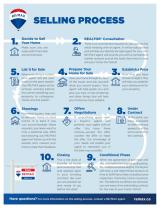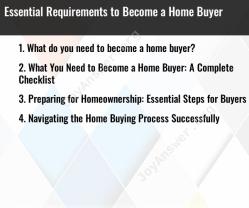What are the first steps towards buying a home?
The first steps toward buying a home can be a comprehensive process. Here's a detailed guide to help you get started on the path to homeownership:
Assess Your Financial Situation:
- Review your credit score and credit report.
- Calculate your budget to determine how much you can afford to spend on a home.
- Save for a down payment, closing costs, and an emergency fund.
Get Preapproved for a Mortgage:
- Contact a mortgage lender or bank to get preapproved for a mortgage loan.
- Provide necessary financial documentation such as income statements and bank statements.
- Understand the types of mortgages available and choose one that suits your needs.
Define Your Homebuying Criteria:
- Determine your housing needs, such as the type of property, location, size, and amenities.
- Consider your long-term goals and how the home purchase fits into your plans.
Find a Real Estate Agent:
- Research and select a reputable real estate agent to assist you with your home search.
- Your agent can provide expert advice, access to listings, and help you navigate the buying process.
Start House Hunting:
- Begin searching for homes that match your criteria. Use online listings, attend open houses, and work with your real estate agent.
- Visit properties to get a sense of what's available in your desired area.
Make an Offer:
- When you find a home you like, work with your agent to make an offer.
- Your offer should specify the purchase price, any contingencies (e.g., inspection, financing), and a proposed closing date.
Negotiate the Deal:
- Be prepared for negotiations with the seller. This may involve counteroffers, adjustments to the offer, and negotiations over terms.
Schedule a Home Inspection:
- After your offer is accepted, hire a qualified home inspector to assess the property's condition.
- The inspection report will help you identify any necessary repairs or issues.
Secure Financing:
- Finalize your mortgage application with your lender.
- Provide any additional documentation required by the lender.
- Review and sign your Loan Estimate and Closing Disclosure.
Conduct a Title Search:
- Have a title company or attorney perform a title search to ensure the property has a clear title and is free from legal issues.
Complete the Closing Process:
- Review and sign all necessary paperwork, including the mortgage and closing documents.
- Transfer funds for the down payment and closing costs.
- Receive the keys to your new home and take possession.
Move In:
- Once the closing is complete, you can move into your new home and start making it your own.
Remember that the homebuying process can vary depending on your location and specific circumstances. It's essential to consult with professionals like a real estate agent, lender, and attorney to guide you through each step and ensure a successful home purchase.
First Steps Towards Buying a Home: A Roadmap for Homebuyers
Buying a home is a significant milestone, transforming dreams into reality. It's an exciting journey that involves careful planning, informed decisions, and a bit of patience. To make this process smoother and more enjoyable, it's crucial to understand and navigate the initial steps involved in home buying.
Navigating the Home Buying Journey: Initial Actions
The home buying journey begins with laying a solid foundation before embarking on the search for your dream home. Here are some essential initial actions to consider:
a. Assess your financial readiness: Evaluate your financial situation and determine your budget for a home. This includes understanding your credit score, calculating your debt-to-income ratio, and assessing your down payment savings.
b. Get pre-approved for a mortgage: Obtaining pre-approval from a lender provides you with a clear understanding of your borrowing power and strengthens your position as a buyer.
c. Define your homeownership goals: Clearly outline your reasons for buying a home, your desired location, preferred property type, and essential features.
d. Find a trusted real estate agent: A knowledgeable and experienced real estate agent can guide you through the process, provide valuable insights, and advocate for your best interests.
The Start of Your Home Buying Adventure
Once you've completed the initial actions, you can confidently embark on the path to homeownership. Here are some key steps involved:
a. Start your home search: Utilize online resources, consult your real estate agent, and attend open houses to find properties that match your criteria.
b. Make an offer: Once you've found your dream home, your real estate agent will help you prepare an offer that is competitive and reflects the property's value.
c. Negotiate and finalize the deal: Be prepared to negotiate with the seller to reach a mutually agreeable price and terms for the purchase.
d. Get a home inspection: A thorough home inspection by a qualified inspector will identify any potential issues with the property's structure, systems, and overall condition.
e. Secure financing: Finalize your mortgage with the lender, ensuring you understand the terms and conditions before closing.
f. Close on the property: The closing process involves finalizing paperwork, transferring funds, and officially becoming the homeowner.
Remember, buying a home is a major decision, and it's perfectly normal to have questions along the way. Don't hesitate to seek guidance from your real estate agent, lender, or legal counsel whenever needed. By approaching the home buying process with knowledge, preparation, and a positive attitude, you can successfully transform your dream of homeownership into reality.












